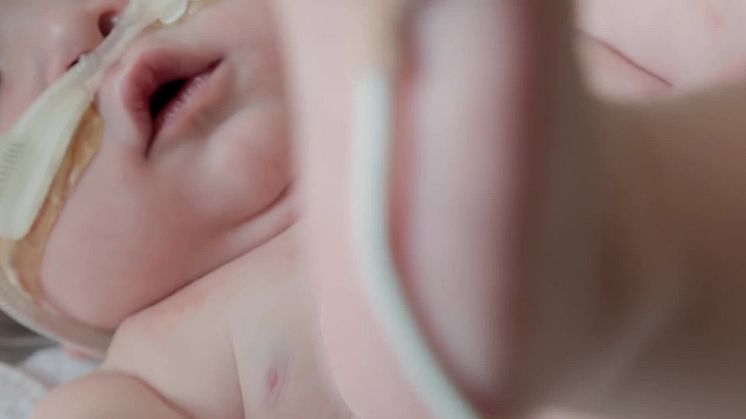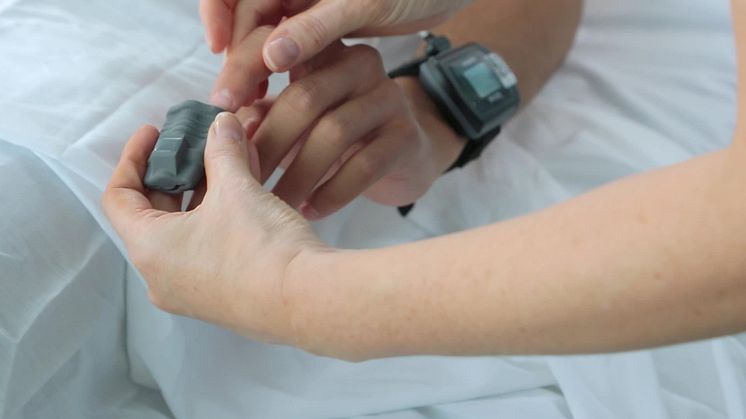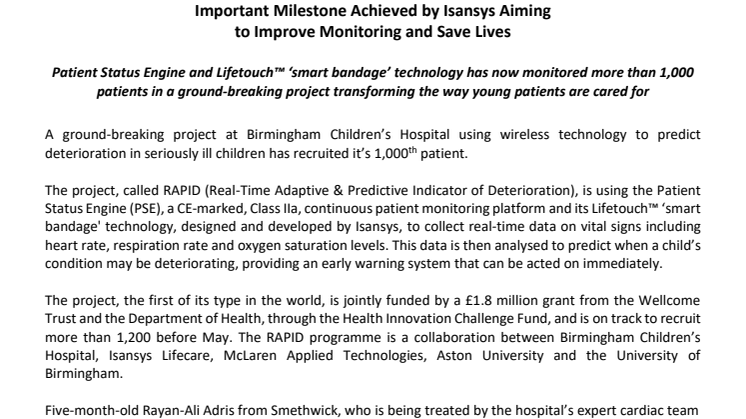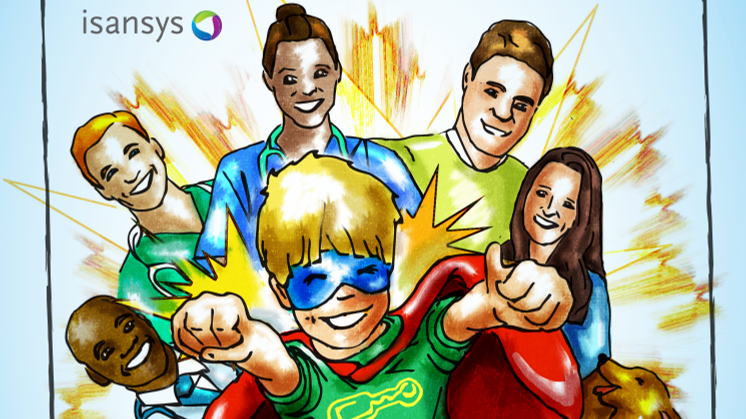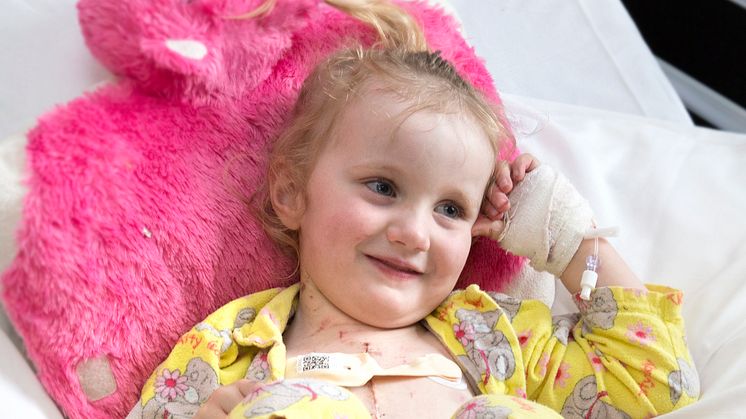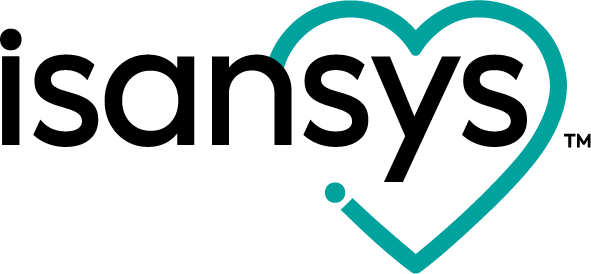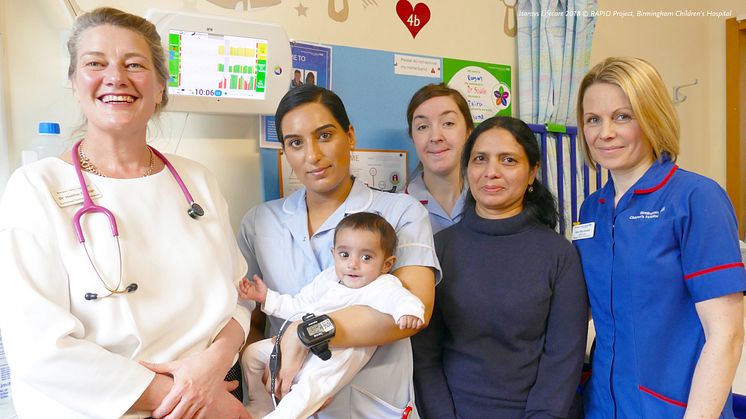
News -
Important Milestone Achieved by Isansys Aiming to Improve Monitoring and Save Lives
A ground-breaking project at Birmingham Children’s Hospital using wireless technology to predict deterioration in seriously ill children has recruited its 1,000th patient.
The project, called RAPID (Real-Time Adaptive & Predictive Indicator of Deterioration), is using the Patient Status Engine (PSE), a CE-marked, Class IIa, continuous patient monitoring platform and its Lifetouch™ ‘smart bandage' technology, designed and developed by Isansys, to collect real-time data on vital signs including heart rate, respiration rate and oxygen saturation levels. This data is then analysed to predict when a child’s condition may be deteriorating, providing an early warning system that can be acted on immediately.
The project, the first of its type in the world, is jointly funded by a £1.8 million grant from the Wellcome Trust and the Department of Health, through the Health Innovation Challenge Fund, and is on track to recruit more than 1,200 before May. The RAPID programme is a collaboration between Birmingham Children’s Hospital, Isansys Lifecare, McLaren Applied Technologies, Aston University and the University of Birmingham.
Five-month-old Rayan-Ali Adris from Smethwick, who is being treated by the hospital’s expert cardiac team for aortic stenosis – a condition that narrows the heart’s aortic valve, is the 1,000th patient to take part in the RAPID study.
Mum, Neelam, said: “I’m so pleased that Rayan-Ali was able to take part in the study. I think the wireless technology is great, I can pick him up more easily and he is constantly monitored”.
Dr Heather Duncan, Birmingham Children’s Hospital intensive care consultant and lead of the RAPID project, said: “Recruiting the 1,000th patient is a really important milestone. We’d like to thank all of our children and families who have helped us since the launch. Their help is so important to the success of the project.
“Work is continuing to progress well as we enter the final phase of this three-year study that’s aiming to revolutionise the way we monitor patients to save lives in the future.”
Vital signs are normally recorded every one to four hours onto paper charts, but the new RAPID technology enables continuous monitoring and analysis of large amounts of data in real time. This allows a more accurate prediction of a patient’s deterioration, which is expected to lead to faster and more targeted responses that can save lives and shorten hospital stays. New care pathways enabled by these new technologies need to be evaluated to establish the clinical and quality outcomes as well as the costs and value for money. The University of Birmingham will be doing the Health Economic analysis and providing the biostatistical support for the study.
Dr Duncan added: “This technology is truly transformational. It allows us to analyse many more patients’ data in real-time for the first time in the same way that various other high-risk industries have done for years. “The ability to track and identify deterioration towards a cardiac arrest will give doctors the chance to save the patient’s life. I genuinely believe that this will change the way we care for patients in hospitals forever.”
Keith Errey, CEO of Oxford-based Isansys, said: “We are delighted that our Lifetouch "smart patches” and wireless patient monitoring platform have now been used to monitor more than 1,000 patients at Birmingham Children’s Hospital. We believe this is the first time that next generation wireless technology has been deployed to monitor children of all ages in hospital and in real-time. Our Patient Status Engine technology is not just enabling freedom from leads and cables, but is also providing continuous vital sign data for the development of new and powerful methods that will allow clinicians, nurses and families themselves, to provide even better care for these young and often vulnerable patients.”
The RAPID project is the product of three years of research, development and testing.
* In July 2011, the First Young Lives study began at Birmingham Children’s Hospital (BCH) with 3,000 children being monitored using vital sign data to prevent potential incidents of cardiac arrest
* In June 2013, 40 children took part in the Second Young Lives project and the results showed how Isansys wireless technology could change the way children can be monitored on wards in the future
* In March 2014, a £100,000 Smart Award from Innovate UK aided a complete redesign of the Lifetouch, a wireless body-worn sensor for paediatric use
In December 2014, Isansys was awarded a £1million contract by the Small Business Research Initiative (SBRI Healthcare) to extend the PSE to include paediatric use and out-of-ward patient monitoring.
Notes to Editors
RAPID is a partnership between Birmingham Children’s Hospital, McLaren Applied Technologies, Aston University, University of Birmingham and Isansys Lifecare Ltd. McLaren Applied Technologies has contributed its unique LIFEINSIGHT platform which processes the data collected in real-time and contains a dashboard to display the relevant information and alerts to hospital staff. Aston University develops and tests the predictive and adaptive algorithm alarm system RAPID, the University of Birmingham ensures the statistics and health outcomes are tracked properly and Isansys Lifecare Ltd are responsible for providing the wireless platform to collect the physiologic data from the patients, and transmit this data to McLaren’s Lifeinsight platform for processing/ analysis and distribution to clinical and nursing staff.
RAPID is funded through the Health Innovation Challenge Fund - a parallel funding partnership between the Wellcome Trust and the Department of Health to stimulate the creation of innovative healthcare products, technologies and interventions and to facilitate their development for the benefit of patients in the NHS and beyond.
http://www.wellcome.ac.uk/Funding/Innovations/Awards/Health-Innovation-Challenge-Fund/index.htm or www.hicfund.org.uk
To find out more about the companies involved in the RAPID project, please click here.

